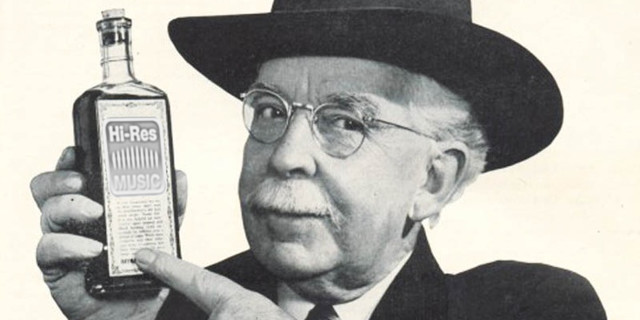MQA Ltd., a spin-off from audiophile equipment manufacturer Meridian Audio, is the purveyor of the “high resolution” audio format MQA — an audacious move to sell a lossy codec purporting to contain audio signals not perceptible to any human ear tested in the past century, and which actually works out to be equivalent to a 13-bit 48kHz FLAC with three bits of quantisation noise.
MQA’s product is not just their patent-encumbered bad codec — it’s the attempt at DRM lock-in all the way down the chain from the studio to your ear. At swingeing licensing fees, of course.
The MQA format was originally developed by legendary audiophile hi-fi engineer Bob Stuart for Neil Young’s Pono audio player around 2013 — when a gigabyte for an album would still have been considered a daunting amount of solid-state storage in a portable player.
Young balked at Meridian’s licensing fees and demands for control. Young and Phil Baker wrote about Meridian in their 2019 book about Pono, To Feel The Music: A songwriter’s mission to save high-quality audio (UK, US):
Stuart told me that Meridian had been trying to address the loss of quality of these compressed MP3 files by creating a better way to reduce file sizes. I often said to him that it’s less of a problem now, as memory prices have come down and would continue to decline, but he had been working on it for so long, I think he came to believe it was more important than it really was.
… Stuart was always somewhat vague about exactly what he was doing, but I thought it would make my downloaded music more efficient, particularly when we would play it on a phone or portable device.
… The terms they proposed to Hamm included monthly payments, royalties for each player sold, more stock, and no exclusivity. The terms were much more onerous than Pono could afford and made no business sense based on normal industry standards. Not only would the software not be exclusive to Pono, but it also restricted what Pono could do with it. For example, if Pono was sold or licensed its player to be built or sold by another company, then his technology could not be included.
When Pono was launched in 2014, it just defaulted to FLAC.
The only substantial MQA licensee was streaming service Tidal for their Hi-Fi Plus tier — for people who thought they had super-human hearing and that 16/44 CD quality on Tidal’s Hi-Fi tier just wasn’t enough. Though apparently Tidal didn’t pay MQA a fee either, and their usage was written off as promotion.
MQA refused to allow any sort of proper A/B/X testing of their codec, and would routinely claim that any objector just didn’t understand the audio magic they wouldn’t explain. One guy, GoldenSound, finally tested MQA on Tidal, and found it severely deficient. MQA’s main objection to GoldenSound’s test was that he had breached MQA licensing deals — so therefore you should ignore the actual tests. Observers were not impressed.
MQA’s last gasp was its attempt to get its MQAir/SCL6 codec into the Bluetooth standard — to send hi-res audio to wireless headphones. Yeah, that was never going to happen.
Anyway, MQA has run out of money and is going into administration:
Following the recent positive reception to MQA’s latest technology (SCL6), there has been increased international interest in buying MQA Ltd. At the same time, MQA’s main financial backer is seeking an exit. In order to be in the best position to pursue market opportunities and expedite this process, the company has undergone a restructuring initiative, which includes entering into administration and is comparable to Chapter 11 in the US. During this process, MQA continues to trade as usual alongside its partners. We won’t be commenting further while negotiations take place.
Will Jennings at Ecoustics thinks that going into administration might let MQA sell off SCL6 and leave the rest of the company to go bankrupt.
Despite all MQA’s deals with labels and Tidal, the market just doesn’t seem to be there for snake oil audio formats or licensing the same. Tidal is moving Hi-Fi Plus to plain FLAC.
Here’s a list of MQA’s owners (archive). The main owners are two investment companies: Muse and Reinet. It’s apparently Reinet that’s pulled the plug.
You’ll see the three major labels and Merlin in the list too. They almost certainly didn’t hand over actual money for their shares of the company — they would have been given equity as part of content licensing and publicity deals.
The shareholders don’t seem to include Meridian Audio. Meridian did get £20 million from MQA for the format — which didn’t work out so great, given MQA’s 2021 revenue was £649,353 but administrative expenses were £4,499,152 and interest payable was £539,128.
The response even from audiophiles to the death of MQA is mostly glee. The Audio Science Review Forums thread is a delight.
A note to commenters: if you want to claim that “hi-res” audio is real, I suggest you read up on the sampling theorem and work through the maths rather than posting here.


Leave a Reply